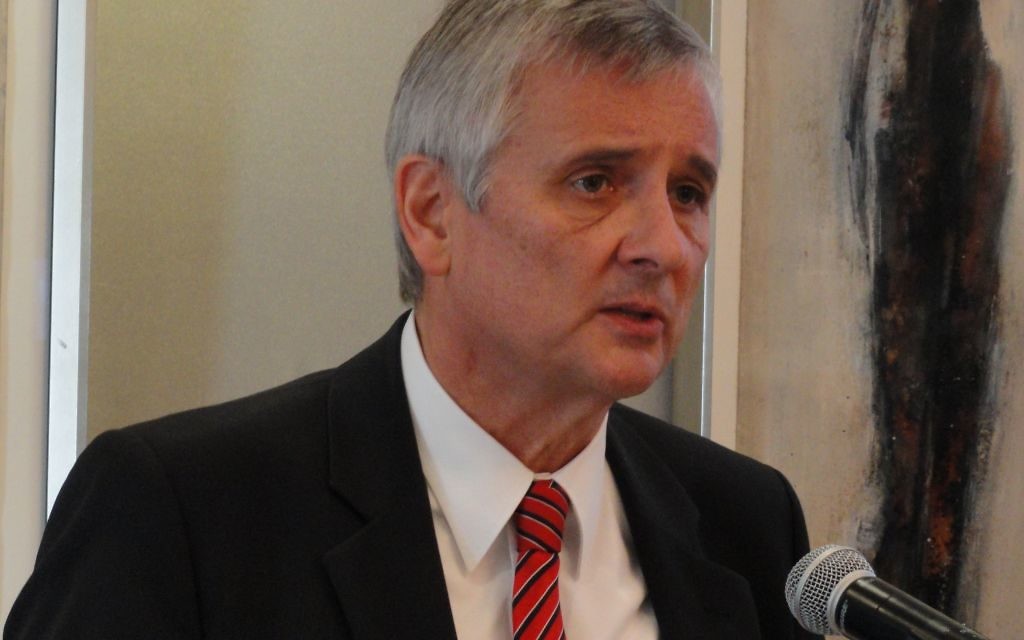German Diplomat: Populism Undermines EU Foundation
Political mainstream in Europe and U.S. has come under question by portions of political spectrum.

“Populism is a thought process that pits the people against the elite,” American Jewish Committee Atlanta’s Debbie Neese said during an AJC trustees meeting Thursday, Jan. 12, at 103 West.
Neese was introducing guest speaker Detlev Ruenger, Germany’s consul general in Atlanta, whose topic was the rising trend of populism in Europe. The explosion of populism, Neese said, has turned into an adversarial relationship among the political left, center and right. She added that right-wing populists are characterized by resentment toward immigrants, Islamists and other groups.
Citing his own country as an example, Ruenger said Germany for many years maintained a stable political system that could adapt to changing times, always directed toward integration and increasing the number of member states in the European Union.
Get The AJT Newsletter by email and never miss our top stories Free Sign Up
That solid structure is now under attack by a variety of what he called “political forces,” such as the far-right Alternative for Deutschland party. A Politico article says that the AfD’s rise in recent years “has been fueled by much the same anti-immigrant, anti-Islam and anti-establishment elements that elevated Trump to power in the United States” and that his win is seen “as a good omen for their controversial movement to make nationalism popular in Germany again — for the first time since World War II.”
Ruenger said the political mainstream in Europe and the United States has come under question by significant portions of the political spectrum.
“From my perspective, this all starts in the postwar years with decolonization and moves through the civil rights movement in the USA, the anti-Vietnam movement, and developments in society that came with it: the miniskirt, the contraceptive pill, women’s lib,” he said.
“Our constitution has been changed time and again, but the core message is still there,” Ruenger said. “As time went on, society (addressed) pro-feminism, pro-abortion, gender balance, language and minority rights, and same- sex marriage. All this became part of the political mainstream, and it was never seriously contested.”
Part of the current problem is the fallout of the EU’s unified euro currency and its economic consequences, Ruenger said, along with the migration issue.
“After the fall of the (Berlin) Wall, the end of nuclear confrontation between the superpowers and the dilution of the Soviet Union, we continued to promote open borders. You can travel anywhere in Central Europe without showing your passport. We are for free trade and fair trade. We’re pro-immigration and multiculturalism, welcoming refugees with no limits, because it’s in the German Constitution,” he said.
“Obviously, we are against racism. We are against anti-Semitism. We are against hate speech and fake news. And we are very political towards populism,” Ruenger said.
“Sadly, in Europe you can find populism in the political arena. In Germany they are in 10 out of 16 regional parliaments. They (the AfD) started as a party dealing critically with the euro; it’s now anti-immigration and anti-Muslim, first and foremost.”
Who votes for the populists?
“The deplorables — old, angry white men left behind by globalization. They come from all corners of society, some actually from the extreme left,” Ruenger said.
The Brexit referendum in the United Kingdom is proof that a right-wing, anti-European movement can win. Ruenger, appalled by that result, recalled with a grimace that he told an audience in England last June, “Don’t worry; it’s not going to happen.”
He said he hopes there will be another vote on Britain’s exit from the EU. “I still can’t believe that this can somehow be the end of the story. Let the British people see the consequences of their decision.”
Furthermore, Ruenger is worried that other countries will follow suit. He cited recent opinion polls in France and Italy showing that almost 50 percent of each population wants to abandon the EU.
“That scares me,” he said. “This is a trend that has to be reversed.”




comments